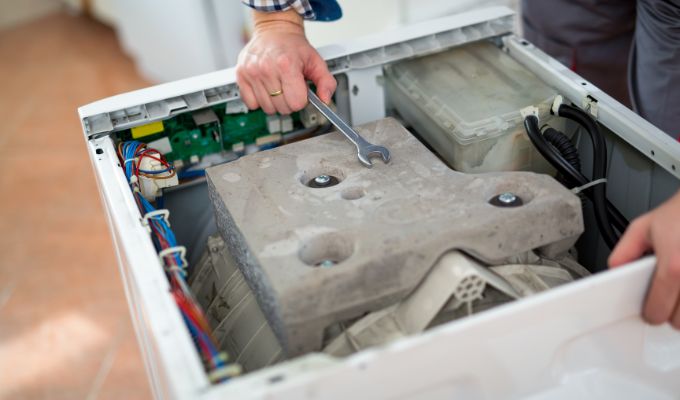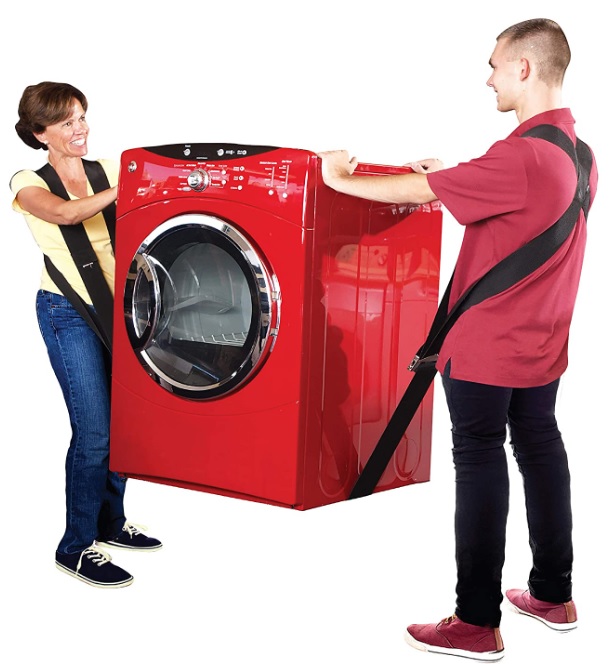Ever tried to move a washing machine by yourself? Yeah, they’re heavy, real heavy!
It’s almost impossible to move a washing machine by yourself, and if there are stairs involved, you can forget it, even two people will struggle to move this leaden laundry appliance. That’s because the average washing machine weighs around 70kg – the same weight as an 11-stone (154-pound) adult person.
- Why Are Washing Machines so Heavy
- Washing Machines and KG Weight Capacity
- How to Move a Heavy Washing Machine
Why Are Washing Machines So Heavy?

Washing machines are designed to be heavy. They’re deliberately weighted down with a heavy concrete block inside them that is there to keep the machine in place during a high RPM wash cycle.
As you’ll know, washing machine drums spin at very high speeds – up to 1600 rpm (revolutions per minute) when rinsing. And because the wet clothes that are spinning in the drum are heavy, it causes a lot of vibrations and wobbles. If the washing machine was lightweight, these intense vibrations would cause the machine to move across the floor, bounce off walls, and even topple over.
If it wasn’t for this concrete block counterweight, washing machines would weigh the same as tumble dryers, making them easy to move around. But this extra weight works with gravity to keep your machine fixed to the one spot, even when you’re machine is on max spin speed.
This concrete block is usually located on the top of the drum or cast in a mould that is shaped to fit around the front frame of the drum. This concrete counterweight makes up the bulk of the weight of a washing machine, and typically weighs around 15kg.
The next most weighty item inside your washing machine is the motor. These units are small, but they’re made of dense metals and are fairly heavy.
When you combine the heavy concrete block counterweight with the motor and the fact that almost all the components of a washing machine are made of metals – including the drum, outer case, flywheel pulley, and bearings – it makes for a heavy pile of parts. It’s little wonder that the washing machine is the heaviest of all household appliances.
Washing Machines and KG Weight Capacity
When you’re shopping for a washing machine, you’ll notice that the machine will have a capacity weight assigned to the machine in kg (kilograms). This label does not represent the net weight of the washing machine. Instead, this represents the weight capacity limit of the washing load.
For example, a washing with a 10.5kg drum capacity means that the machine can efficiently wash a maximum weight of 10.5kg of dry laundry. It’s simply a weight limit indicator for how much laundry it can handle in a wash cycle and has nothing to do with the net weight of the appliance.
With that said, a washing machine with a higher KG weight capacity will have a larger drum and a more powerful motor, which may mean these parts are heavier than you’d find in smaller KG capacity machines.
Also, because higher kg capacity washing machines will be spinning a heavier laundry load, the concrete counterweight could be bigger and heavier, too.
Let’s look at different models of weight capacities and see how they compare in terms of the washing machines’ net weight.
LG TrueSteam™ FH4G1BCS2 Washing Machine
- Load Weight Capacity: 12kg
- Net Weight: 75kg
Hoover H-WASH 500 HW411AMBCB/1 Washing Machine
- Load Weight Capacity: 11kg
- Net Weight: 73kg
Haier i-Pro Series 7 HW100-B14979S
- Load Weight Capacity: 10kg
- Net Weight: 77kg
Samsung Series 5 ecobubble™ WW90TA046AE
- Load Weight Capacity: 9kg
- Net Weight: 68kg
Beko WTL84121W 1400rpm Washing Machine
- Load Weight Capacity: 8kg
- Net Weight: 67kg
Bosch Series 2 WAJ28008GB Washing Machine
- Load Weight Capacity: 7Kg
- Net Weight: 68kg
As you can see, the net weight for washing machines varies depending on the laundry load capacity and averages out to around 70kg, but as the kilogram laundry load capacity increases, so too does the net weight. The higher the KG capacity, the heavier the total weight of the washing machine in KG, more or less.
How to Move a Heavy Washing Machine
First, make sure you’ve checked the new washing machine’s dimensions against the place where you plan to place it. The last thing you want to do is go through the struggles of moving a heavy washing machine, only to find that it’s too big for the space.
Now that the big day has arrived, you need to figure out how to move your washing machine without hurting your back. You risk breaking the appliance or, worse yet, hurting yourself if you try to move the washing machine by yourself.
Keep in mind that a washing machine weighs anywhere from 60 to 80 kilogrammes (kg) and typically lacks handles or wheels for easy transport. Therefore, on the day of the move, there must be at least 2 people present to transport it, with the right equipment.
The less time you spend carrying the washing machine, the better, so take your time deciding where to transfer it before you get started.
If you’re using lifting straps, you can lower yourself by bending your knees before raising the washing machine. Tilt the washing machine to one side and slide the movable strap under it. These straps will spilt the weight of the washing machine equally between two people, so a 60kg machine becomes 30kg each, and much more manageable. With that said, follow the instructions on how to use these straps safely.

You’re lifting partner will perform the same action on the opposite side of the device. Then, you can lift the machine with one hand by pulling on the strap while keeping it steady with the other. There is a technical aspect to this manoeuvre, but with some practise and, it will save your back and make carrying much simpler (since it remains straight).
There’s also the option of hiring expert moving crews. Considering if you have the person power to make the move safely, needless danger should be avoided. The washing machine requires lifting and manoeuvring skills, so it may be better to call in professionals.



